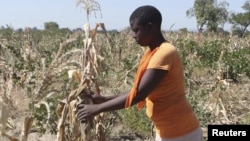Aid organizations are sounding the alarm over a food crisis in Southern Africa that was caused by yet another season of poor weather that this year involved devastating floods followed by withering drought.
Aid officials at the International Federation of Red Cross and Red Crescent Societies say they are launching a multimillion dollar appeal -- starting with an appeal for about 1 million dollars for each crisis in Zimbabwe, Malawi and Namibia.
Dr. Michael Adekunle Charles, who is the organization’s Acting Regional Representative for Southern Africa, said this is a crisis with deep roots -- and far-reaching consequences. From Austin, Texas VOA’s Southern Africa correspondent, Anita Powell, spoke to Dr. Charles, who is in Johannesburg, via Skype.
Powell: Thank you so much for joining us today, Michael. Can you tell us what’s going on in the Southern African region?
Charles: So in Southern Africa, we are faced by potential droughts, food insecurity to be precise. We have a region, southern African region of 270 million people and we expecting that about 27 million people will be affected by the droughts, which is about 10 percent of the people, which is quite significant if we are talking about droughts in the coming months.
Powell: So, can you tell us, what is the cause of this crisis? We understand it is tied to the weather.
Charles: In Southern Africa, and I can give the example of Zimbabwe, we have had at the beginning of the year, we had excessive rain, we had floods, the crops were destroyed that were planted, so they couldn't be harvested. Immediately after that we had droughts, lack of rain or very limited rain. Again, we couldn't go into the planting season because of the lack of rain...This is not the first time it’s happening. For the last three, four years we’ve been seeing this effect over and over and over again, and this is actually a compilation of all the years of bad harvests has now come to the forefront in terms of all the excess produce is now gone and we are really at a stage whereby we could be faced with people who have very, very little to eat or no food at all.
Powell: As a doctor yourself, can you tell us what are the consequences of malnutrition and not enough food, especially for the children in these areas?
Charles: So we have stunting on the one hand, they are short because of lack of nutrients. The brain growth is also limited and this affects education in the longer run. That’s one aspect in terms of malnutrition. The other health aspect we look at is that in Southern Africa, this is really the epicenter of HIV/AIDS… Now if you have lack of food, malnutrition, you see that people who are on HIV antiretrovirals are not able to take their medication because they don’t have food. Again, this worsens things. If you see issues around people who are drawn out of school to work on the farms -- because, again, there is lack of food -- we see that the females go into sexual, commercial sex work. And again, this spreads the prevalence of HIV/AIDS. So I think this is quite a complex issue in terms of how do we deal with it.
Powell: And so finally, Michael, what do you think needs to be done here?
Charles: We need support in this. This is something in Southern Africa that’s affecting other parts of Africa, climate variation affects the whole globe. So we really need to focus on this. We need to support our communities, and the only way we can do that is to really put our money where our mouth is . We need to support in the acute phase, we need to support in the longer-term phase. And for me, quite critical is looking at the longer term. How do we ensure that we prevent this from happening over and over and over and over again.










